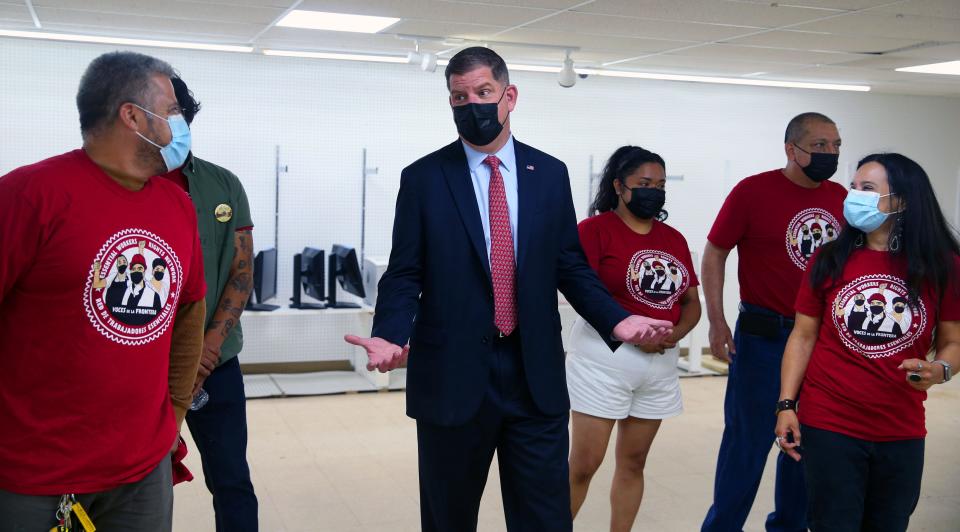Key takeaway from Secretary of Labor Marty Walsh's Milwaukee visit to tout American Jobs Plan
Labor Secretary Marty Walsh made several stops in Milwaukee Wednesday to rally support for the Biden administration's $1.7 trillion infrastructure proposal called the American Jobs Plan.
The plan faces an uphill battle in the U.S. Senate, where Republican opponents have raised concerns about the plan's costs, funding sources and inclusion of elements that are not traditionally considered infrastructure.
RELATED: Biden administration touts American Jobs Plan's benefits for Wisconsin
Walsh compared the American Jobs Plan to the Great Depression-era New Deal, saying, "The last time we had a movement like this was when Franklin Delano Roosevelt was president."
Wisconsin has been more successful at addressing the nation's slow return to employment than other states, coming with the ninth lowest unemployment rate in the country in April.
Walsh said the key to maintaining that growth is enacting the American Jobs Plan, and he highlighted concerns over child care availability and the need for living wages to push back on GOP criticism that the infrastructure bill is too broad.

Child care identified as a key
Child care struggles dominated a roundtable talk at Wisconsin Regional Training Partnership, a nonprofit that provides training and serves as an intermediary between apprentices and employers.
Walsh was joined by the organization's president and CEO, Lindsay Blumer, as well as County Executive David Crowley, Gov. Tony Evers and U.S. Rep. Gwen Moore.
Roundtable participants emphasized the need for more industry diversity and more child care support.
One worker expressed frustration with the benefits cliff she experienced once she began making more money during her apprenticeship.
"So now I'm paying the full cost of child care and there's someone on W-2 getting all of their child care subsidized," Shantel Collins, a LiUNA! Local 113 laborer, WRTP graduate and mother of two, said tearing up.
Despite national calls from Republicans to tighten unemployment insurance distribution, including Wisconsin's reinstatement of the job searching requirement for unemployment benefit recipients, Walsh rejected the idea that the enhanced payments are to blame for the country's labor shortage. Instead, he pointed to coronavirus concerns and issues around wages and child care.
RELATED: Work search requirement for unemployment benefits will restart Sunday. Here's what you need to know
"I don't buy that," he later said. "I think people want to get back to work."
Walsh also said the lack of child care affordability and living wages will continue to be an impediment to get Americans back to work.
"I think we're going to have to have a bigger conversation about wages," he said. "That's why the president is interested in pushing a $15-an-hour minimum wage."
The Biden administration has allocated $225 billion in its American Families Plan for child care subsidies, and child care will also be an element of the American Jobs Plan.
Immigration and citizenship rights
Walsh met with members of Voces de la Frontera, a community rights group, as well as members of the Milwaukee Area Labor Council for a discussion on immigrant workers’ rights.
Six essential workers, union members and immigrant rights activists
two propositions for Walsh: Citizenship for all, especially immigrant essential workers, to be included in the next coronavirus relief bill and to ensure tworkers have protections against retaliation based on immigration status when their rights are violated.
“Immigration is fundamentally an issue about workers’ rights,” said Christine Neumann-Ortiz, executive director of Voces de La Frontera.
The speakers included people like Alondra Garcia, a teacher, and her father Gilberto Garcia, an essential worker in the food industry. The two reflected on how difficult it was to work through the pandemic when Gilbert Garcia contracted COVID-19 in his job and was forced to stay home from work without pay.
“My parents can’t apply for unemployment,” Alondra Garcia said.
Walsh vowed to push for a pathway to citizenship in the bill as well as protections for workers.
Contact Talis Shelbourne at (414) 403-6651 or tshelbourn@jrn.com. Follow her on Twitter at @talisseer and message her on Facebook at @talisseer.
This article originally appeared on Milwaukee Journal Sentinel: Labor Sec. Walsh: Jobs plan about 'investing in American workers'

